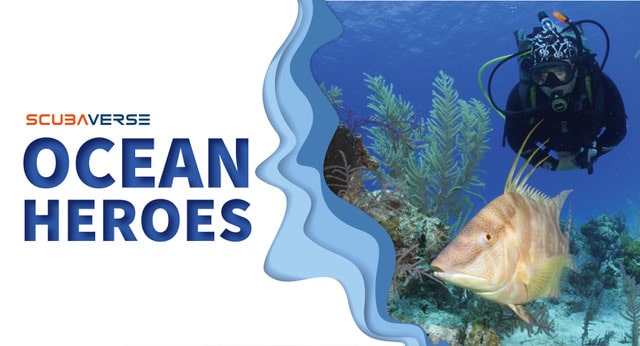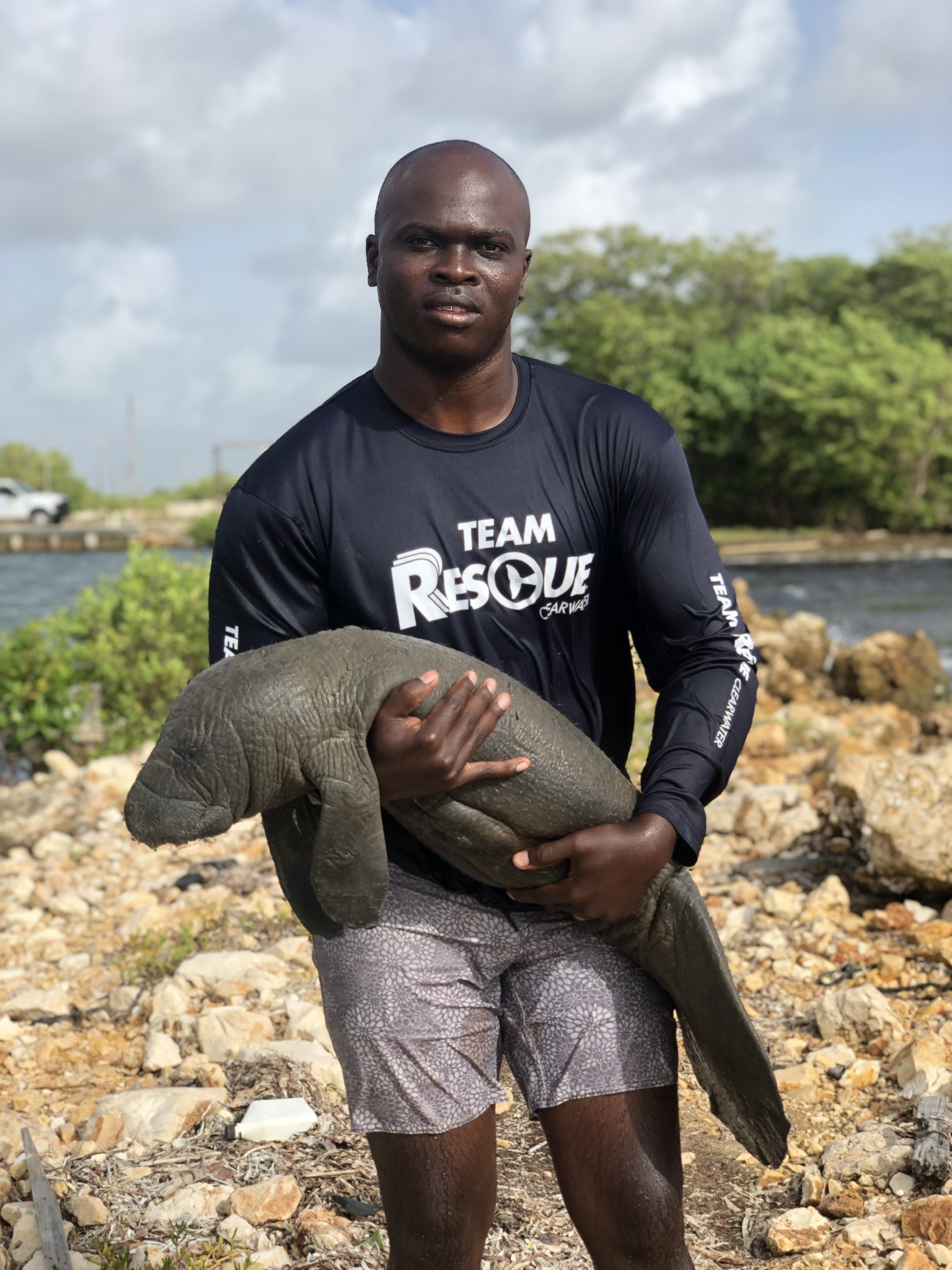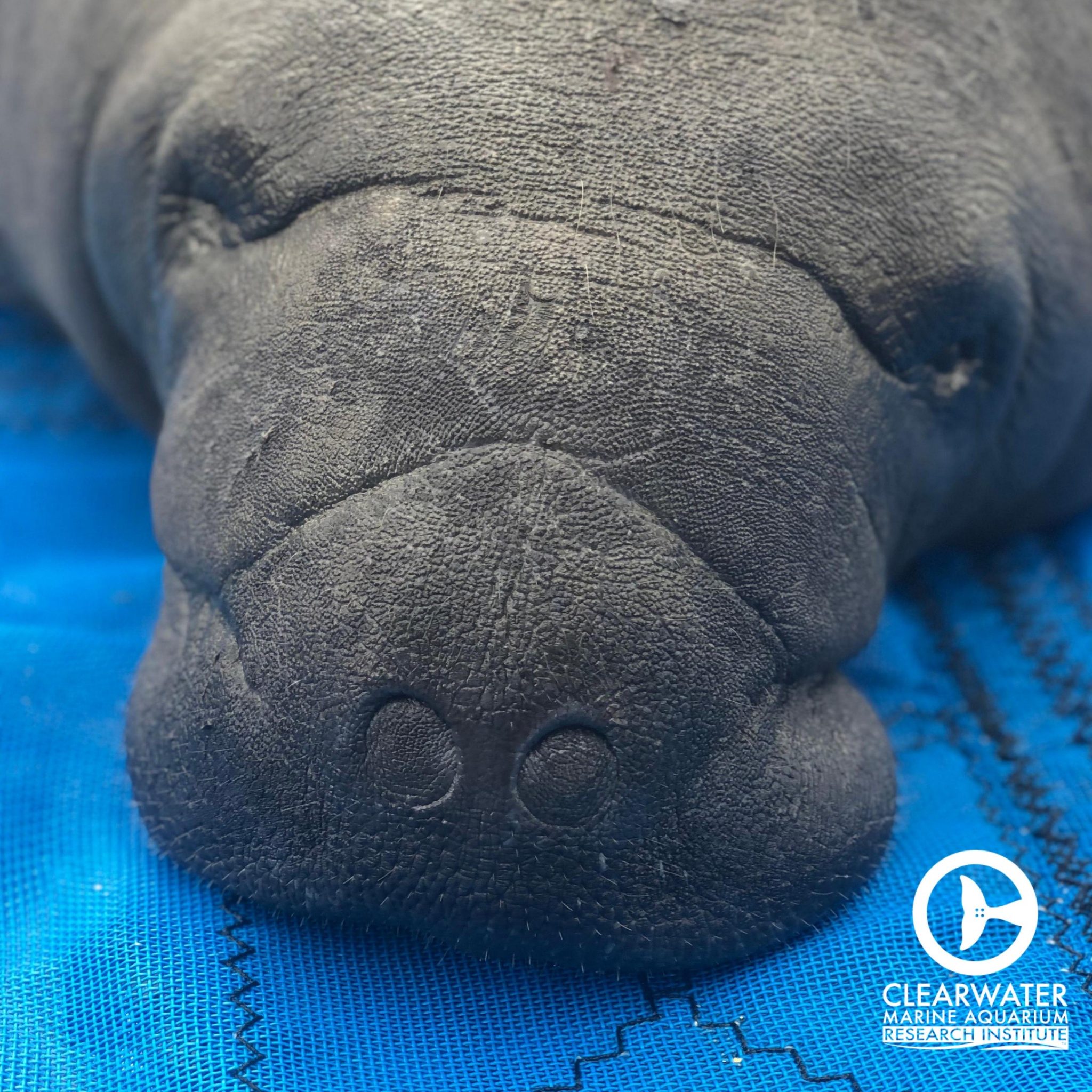Marine Life & Conservation
OCEAN HEROES: Jamal A. Galves (Manateeman)

Our new series, Ocean Heroes, showcases the fantastic marine conservation work done by individuals and groups around the world. In this edition we talk to Jamal A. Galves, also known as Manateeman.
 Jamal is from Belize, specifically a small coastal village outside of Belize City named Gales Point Manatee where he grew up. He went to school at St John’s Junior College & then went on to study at the University of Belize.
Jamal is from Belize, specifically a small coastal village outside of Belize City named Gales Point Manatee where he grew up. He went to school at St John’s Junior College & then went on to study at the University of Belize.
Caroline: How did you get involved with marine conservation?
Jamal: I have always been fascinated by manatees. As a young boy, I would stand on my grandparents’ lawn in Gales Point Manatee and observe manatees swim through the lagoon. I would spend long hours sitting on the dock, dreaming of one day being able to work with the gentle herbivores. At the age of 12 this dream became a reality.
I caught the attention of a field research team, led by renowned manatee conservationist Dr. James “Buddy” Powell, that visited my village every year to study manatees. The team noticed how enthusiastic I was about manatees and brought me along on their boat to observe. That one trip out resulted in me coming back day after day, eager to learn more and help wherever I could.
I have volunteered with the team since then and my dedication and commitment has only increased resulting in becoming a member of the team at age 16. Today I am the coordinator of the Belize Manatee Project Program for the Clearwater Marine Aquarium Research Institute, an organization that works to protect and conserve coastal ecosystems and species. Though I have had a fair amount of success I have seen the impact these animals faced due to human negligence and that continues to drive me to ensure these animals are protected
Though manatees are currently endangered, I am hopeful about the species’ survival. “As a child I never would have thought manatees would be endangered. However, I am very optimistic about their future. Otherwise, I wouldn’t do what I do.”
Ultimately, I wish to inspire the next generation through my efforts. “I believe that when young people decide to save a threatened species, it’s inspirational. That inspiration can be contagious and provide encouragement to others”. That is exactly what happened to me, Jamal, the boy who saves manatees.
Caroline: Tell us about the Belize Manatee Conservation Program
Jamal: In 1997, Dr. James “Buddy” Powell, Bob Bonde of USGS, Nicole Auil of the Belize Coastal Zone Management Authority and a Sea to Shore (now CMA Research Institute) associate research scientist, began the Belize Manatee Conservation Project.
Belize has the highest known density of Antillean manatees, a subspecies of the West Indian manatee, in the world. Unfortunately, because of rapidly increasing coastal development, human-related manatee deaths are rising quickly. Poaching, once the major threat to manatees in Belize, has been replaced by boat kills and destruction of habitat as the major concerns for the survival of the species.
CMA Research Institute scientists and collaborators provide the data, expertise and scientific exchange that are used by the Belize government to establish sanctuaries, speed zones, laws and regulations that safeguards manatees and other actions that help ensure the survival of manatees in this remarkable country.
I was just a boy at age eleven when I met Buddy at the dock preparing to head out for manatee health assessments. I asked if I could join the team and began volunteering in efforts to protect the manatee of Belize. After years of expressing his devotion, interest and passion for the conservation of the endangered manatees, I was officially hired as a Field Assistant in 2008. Today, I am the Belize Manatee Conservation program coordinator.
Program Activities
- Conduct countrywide community-related education and outreach programs coordinate the Belize Marine Mammal Stranding Network.
- Serve as a resource and representative on relevant government and local committees, such as the Belize Manatee working group.
- Track and monitor tagged, wild manatees.
- Create public information brochures and posters on manatees and their habitat.
- Communicate with the media and the public on manatee conservation issues.
- Continue critical fundraising efforts for our programs and handle all aspects of managing, administering, and maintaining an active research and conservation program in Belize.
Examples of Program Success
- Speed Reduction and No-Wake Zones
Implemented speed zones and installed and maintain no-wake zone signage in the waters off Belize City.
- Decreased Poaching
Through research and awareness efforts we have decreased poaching incidents in the country. In 2010 a poaching incident in Belize was prosecuted. This is the first time anyone has been prosecuted for killing a manatee in Belize.
- Population Monitoring
We have successfully captured and carried out health assessments on 164 individuals since 1997. The data set we have gathered over the years through consistent health assessments of this wild population is helping to provide vital information on the population’s status, and what measures and efforts still need to be taken to ensure manatees continue to exist.
- Rescue, Rehab, and Release
Our Belize team has successfully rescued and transported many injured, sick or orphaned manatees to a rehabilitation facility for care, and have reintroduced and monitored those animals in the wild following recovery
Caroline: What is so special about manatees?
Jamal: They are the only herbivorous mammals in Belize’s water ways and Belize has the last strong-hold on the population throughout its range. Manatees provides critical role within Belize’s marine ecosystem as they are considered nutrients recyclers as they consume about 10% of their body weight daily which then turns to excretion that acts as nourishment for small fishes and crustaceans. I have to mention that they are very gentle, charismatic and cute.
Caroline: What success stories have you had? Can you tell us more about the baby manatee you recently rescued?
Jamal: On July 13 2020 I, Associate Research Biologist, and a team of volunteers from the Clearwater Marine Aquarium Research Institute, rescued a male orphan manatee calf in Belize that is estimated to be two to four weeks old. The calf was observed the previous day alone and showing signs of distressed. The baby manatee was later taken to the rehabilitation centre, to receive around-the-clock care. The young male was only 36 lbs when it came in and has shown great signs so far. He will spend the next 3-4 years in rehab until he is fit and ready to be returned into the wild.
Watch the rescue video here:
Caroline: What is the biggest threat to manatees in Belize?
Jamal: Watercraft collision, entanglement, habitat destruction, pollution and poaching
Caroline: If you could persuade people to change their lives in one way, what would you ask them to change?
Jamal: I would ask them to change their appreciation and kindness for the environment and all wildlife. As by simply changing that and having an appreciation for those things one will naturally change other behaviours that impact both the environment and wildlife and will realize by doing so it also benefits human livelihoods.
CRB: Where can our readers find out more about the work that you do?
Keep up with Jamal Galves’ work with manatees on Instagram and Facebook.
Learn more about The Clearwater Marine Aquarium Research Institute by clicking here, or by following them on Instagram here.
Marine Life & Conservation
Paul Watson Released as Denmark Blocks Japan’s Extradition Bid

Renowned anti-whaling activist Paul Watson has been released from custody in Greenland after spending five months in detention. Denmark’s Justice Ministry rejected Japan’s request for his extradition, citing insufficient guarantees that his time already served in custody would be credited against any potential sentence.
The 74-year-old Canadian-American was arrested on July 21 in Nuuk, Greenland’s capital, when his ship docked to refuel. His arrest was based on a 2012 Japanese warrant related to a 2010 encounter in Antarctic waters. Japan alleged Watson obstructed operations and caused damage to a whaling research ship during efforts to disrupt illegal whaling. Watson has consistently denied these claims, maintaining his commitment to marine conservation.
Denmark, which oversees extradition matters for Greenland, concluded that while the legal conditions for extradition were met, the lack of assurances from Japan regarding time-served credit made extradition untenable.
In a video shared by his foundation, Watson expressed gratitude and relief, saying, “After five months, it’s good to be out… and good to know they’re not sending me to Japan.” He added that the most difficult part of his time in custody was being separated from his two young sons.
Watson is a pioneering figure in marine conservation, known for founding the Captain Paul Watson Foundation in 2022 after decades of activism with the Sea Shepherd Conservation Society. His bold efforts to defend marine life have earned him widespread support, including from celebrities and conservationists. His work has also been featured in the acclaimed reality TV series Whale Wars.
Watson’s lawyer, Jonas Christoffersen, praised the decision, stating, “We are happy and relieved that Paul Watson is now free.” He added that Watson is eager to reunite with his family and continue his vital work.
The arrest occurred while Watson’s vessel, the M/Y John Paul DeJoria, was en route to the North Pacific with a team of 26 volunteers to intercept a Japanese whaling ship. His foundation described the arrest as politically motivated and emphasized that Watson’s actions were focused on ending illegal whaling practices.
Japan resumed commercial whaling in 2019 after leaving the International Whaling Commission, asserting that whale meat is a cultural tradition. Conservationists, however, continue to challenge these practices, highlighting their impact on marine ecosystems.
Despite the challenges, Watson remains steadfast in his mission to protect marine life and bring attention to whaling practices. His dedication to ocean conservation has made him a globally respected advocate for the environment.
Marine Life & Conservation
12 Days of Zero-Waste Fish-mas

This holiday period, the Marine Conservation Society, the UK’s leading ocean membership charity, invites you to make some simple changes to eating fish this Christmas to help our seas.
Dr Kenneth Bodles, Head of Fisheries and Aquaculture at the Marine Conservation Society, said, “During the festive season, our consumption increases, but so does waste. Sustainability isn’t just about where food comes from – it’s also about how you use it. By reducing waste and making the most out of your seafood, you’re not only taking steps to be more ocean-friendly, but can also help to cut costs during what is often one of the most expensive times of the year”.
The Marine Conservation Society has compiled twelve tips on how to consume seafood sustainably with zero-waste this Christmas:
Buy whole fish instead of fillets
Instead of fillets, consider buying whole fish such as salmon, hake, or lemon sole. By adopting a “nose to tail” approach with cooking, whole-baked fish not only feeds a crowd, but also helps to minimise waste and maximise sustainability by using up every part of the animal, including bones, skin, and fat.
Make fish stock
Leftover fish bones or shells can be put to good use by boiling them to make a nourishing fish stock or bisque. This can be frozen and preserved for later use and makes for a flavourful base in a soup.
Make your own fish pâté
Avoid waste by turning leftover fish, such as smoked mackerel or salmon, into a delicious pâté by blending with cream cheese and lemon. Perfect when paired with crackers.
The sustainability of salmon and mackerel varies depending on where and how it is caught or farmed. For more information on green-rated options, check the charity’s Good Fish Guide.
Buy frozen
By purchasing seafood that is frozen or vacuum-packed, this helps to reduce waste by extending the shelf life of your food.
Fish pie
If you’re wondering what to do with leftover cooked fish, why not opt for a classic fish pie with mashed potatoes, leeks, and a cheesy sauce? A sure crowd pleaser on Boxing Day.
Use the head
Don’t forget the fish head! The meat is incredibly tender and flavourful. The charity recommends a cod’s head curry or recreating Fallow’s renowned cod’s head in siracha butter.
By stretching your ingredients further, not only is this a more sustainable way to enjoy seafood, but also cost-effective by repurposing leftovers and cooking creatively.
Boxing Day brunch
Mix leftover kippers or smoked salmon with scrambled eggs for a tasty, zero-waste, Boxing Day brunch.
For best choice, make sure you buy kippers, or herring, from the North Sea and the North Irish Sea.
Zero-waste storage
A top tip from the Marine Conservation Society to avoid waste is freezing fish offcuts to save for future use.
Crisp up the skin
Even leftover fish skin can be turned into a quick savoury snack by crisping it up in an air fryer with a little olive oil and salt.
Anchovies two ways
Leftover anchovies can either be blended with butter to make a delicious anchovy butter or tossed into pasta for a hit of umami flavour.
The charity recommends opting for anchovies caught in the Bay of Biscay for best choice.
Fishcakes
For an easy, zero-waste meal, leftover seafood trimmings can be mixed with mash and fried in breadcrumbs to make fishcakes.
Pickled mussels
Try pickling mussels in 1:1 vinegar and water, with a dash of sugar for a sustainable, zero-waste snack that can be enjoyed well beyond the festive season.
Mussels farmed in the UK are a seafood superhero. Grown using low-impact methods and harvested by hand, they get all the food they need from the sea around them. This makes them one of the most sustainable, ocean-friendly, and cost-effective seafood options.
Players of People’s Postcode Lottery have raised £6.6M towards the Marine Conservation Society’s vital work in making seafood more sustainable.
Laura Chow, Head of Charities at People’s Postcode Lottery, said: “Fish is a festive favourite for many, but making sustainable choices when it comes to how we buy and eat seafood makes all the difference for our ocean. Support from players of People’s Postcode Lottery has helped the Marine Conservation Society further its sustainable seafood work, so that we can all enjoy healthier, better protected seas.”
The Marine Conservation Society encourages you to make sustainable seafood choices a year-round habit, not just for Christmas. To check how sustainable the seafood on your plate is, you can visit the charity’s Good Fish Guide. The Guide helps consumers and businesses identify the most sustainable seafood using a simple traffic light system, based on where and how species are caught or farmed. Green is the best choice, amber means improvements are needed, and red indicates fish to avoid buying.
Zero-waste gift idea
Why not embrace a zero-waste Christmas by gifting a membership to support marine conservation? It’s a meaningful, low-waste gift that helps protect our ocean for generations to come. Memberships start from as little as £5 a month – the price of a sandwich and drink from your local coffee shop.
Find the latest sustainable seafood advice for wild-caught and farmed seafood on the Good Fish Guide, downloadable to your phone from www.mcsuk.org/goodfishguide.
-

 News2 months ago
News2 months agoIconic SS United States to become the World’s Largest Artificial Reef
-

 News3 months ago
News3 months agoBook Review – 52 Assignments: Underwater Photography
-

 Gear News3 months ago
Gear News3 months agoDYNAMICNORD – New German diving brand enters the British market
-

 News3 months ago
News3 months agoExploring Cenote El Pit: A Diver’s Dream
-

 Gear News3 months ago
Gear News3 months agoTry BARE drysuits (and maybe even win one!) this Friday with Sea & Sea at North West Dive Fest
-

 Marine Life & Conservation3 months ago
Marine Life & Conservation3 months agoBook Review: Coral Triangle Cameos
-

 Blogs2 months ago
Blogs2 months agoDive the Egyptian Red Sea this Autumn with Regaldive
-

 News3 months ago
News3 months ago2024 Ocean Art Underwater Photo Competition Announced






